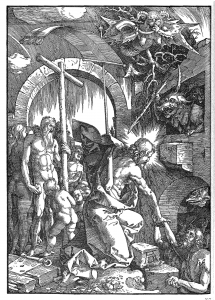for three days in hell?
Too often, as Catholics, we take our faith for granted, never questioning what we believe, and never attempting to gain greater understanding of what it is that we profess. It is as if, at some point in our lives, we have placed ourselves on autopilot, expecting God to steer the course while we sit back, relax, and enjoy the ride. When asked to attend to the simplest of tasks or read the briefest of instructions, we continue to dwell within ourselves and take a pass on discovering the deeper meaning that lies before us.

Christ’s Descent into Hell
How many times have we presented ourselves before God and offered ourselves and our prayers in praise and thanksgiving while allowing our minds to drift far beyond the walls of God’s house. How many times have we left the church with no memory retained of what was prayed, what was read, or what was spoken. We remember entering and we remember leaving but nothing in between. It is as if we came, we sat, we took a nap, we rose, we turned, and then we left, weekly obligation fulfilled.
A complete stranger recently asked, in all seriousness “What did Jesus do for three days in hell?” obviously referring to the statement found in the Apostles Creed where we pray “…was crucified, died and was buried; he descended into hell; on the third day he rose again from the dead; …” I later recounted this question and my response to a small faith-sharing group and was surprised that no one in attendance knew how to respond to the question.
While the Apostles Creed uses the word hell to describe where Jesus went after his death, the Hebrew word was sheol. Unlike our current belief of hell as the place of the damned, ancient Jewish belief was that sheol, in a very general way, designated the kingdom of the dead which included both the good as well as the bad.
Jesus came to save all of mankind, both the living and the dead, all those who came before, all who were living then, and all those who would come after. Thus, after his death, Jesus descended into the netherworld, the kingdom of the dead, sheol or hell, to lead the good who had died before him to paradise.
How many times have we recited the Apostles Creed and declared that Jesus descended into hell without ever asking why, without ever asking what did he do for those three days in hell? How often have our lips moved and our voices sounded the words of prayer while our minds and hearts are absent from that time and place, lost in another dimension of thought and awareness.
Perhaps it is time to open our hearts and minds to the presence of God in our lives, to refocus our attention and energy on our relationship with He who created us and loves us beyond all measure. Perhaps it is time to delve deeper into what it is that we pray, what it is that we read, and what it is that God is saying to each of us. Perhaps it is time for us to wake up and realize that the autopilot we have been relying on may not be taking us where we wish to go.
